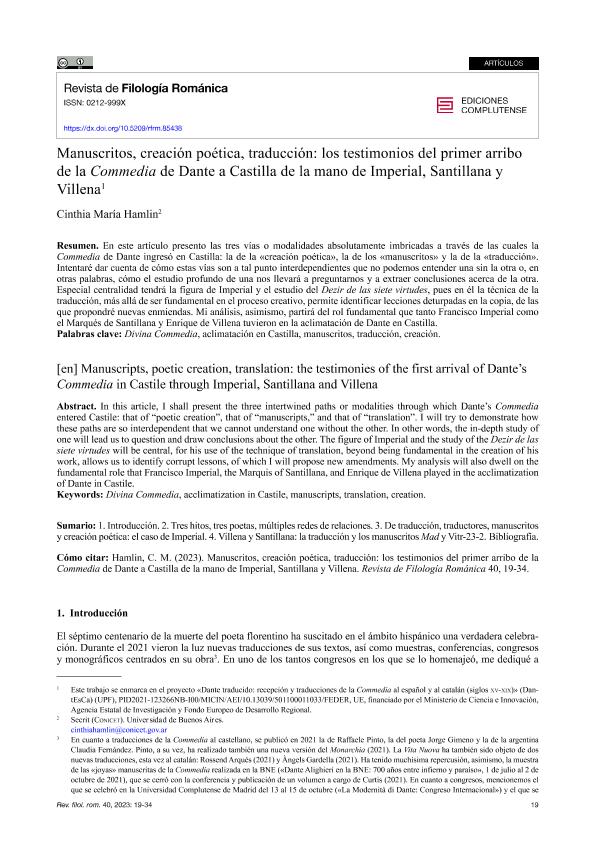Mostrar el registro sencillo del ítem
dc.contributor.author
Hamlin, Cinthia Maria

dc.date.available
2024-03-07T11:20:37Z
dc.date.issued
2023-07
dc.identifier.citation
Hamlin, Cinthia Maria; Manuscritos, creación poética, traducción: los testimonios del primer arribo de la Commedia de Dante a Castilla de la mano de Imperial, Santillana y Villena; Servicio de Publicaciones, Universidad Complutense; Revista de Filologia Romanica; 40; 7-2023; 19-34
dc.identifier.issn
0212-999X
dc.identifier.uri
http://hdl.handle.net/11336/229614
dc.description.abstract
En este artículo presento las tres vías o modalidades absolutamente imbricadas a través de las cuales la Commedia de Dante ingresó en Castilla: la de la «creación poética», la de los «manuscritos» y la de la «traducción». Intentaré dar cuenta de cómo estas vías son a tal punto interdependientes que no podemos entender una sin la otra o, en otras palabras, cómo el estudio profundo de una nos llevará a preguntarnos y a extraer conclusiones acerca de la otra. Especial centralidad tendrá la figura de Imperial y el estudio del Dezir de las siete virtudes, pues en él la técnica de la traducción, más allá de ser fundamental en el proceso creativo, permite identificar lecciones deturpadas en la copia, de las que propondré nuevas enmiendas. Mi análisis, asimismo, partirá del rol fundamental que tanto Francisco Imperial como el Marqués de Santillana y Enrique de Villena tuvieron en la aclimatación de Dante en Castilla.
dc.description.abstract
In this article, I shall present the three intertwined paths or modalities through which Dante’s Commedia entered Castile: that of “poetic creation”, that of “manuscripts,” and that of “translation”. I will try to demonstrate how these paths are so interdependent that we cannot understand one without the other. In other words, the in-depth study of one will lead us to question and draw conclusions about the other. The figure of Imperial and the study of the Dezir de las siete virtudes will be central, for his use of the technique of translation, beyond being fundamental in the creation of his work, allows us to identify corrupt lessons, of which I will propose new amendments. My analysis will also dwell on the fundamental role that Francisco Imperial, the Marquis of Santillana, and Enrique de Villena played in the acclimatization of Dante in Castile.
dc.format
application/pdf
dc.language.iso
spa
dc.publisher
Servicio de Publicaciones, Universidad Complutense

dc.rights
info:eu-repo/semantics/openAccess
dc.rights.uri
https://creativecommons.org/licenses/by/2.5/ar/
dc.subject
COMMEDIA EN CASTILLA
dc.subject
IMPERIAL
dc.subject
SANTILLANA
dc.subject
VILLENA
dc.subject.classification
Literaturas Específicas

dc.subject.classification
Lengua y Literatura

dc.subject.classification
HUMANIDADES

dc.title
Manuscritos, creación poética, traducción: los testimonios del primer arribo de la Commedia de Dante a Castilla de la mano de Imperial, Santillana y Villena
dc.title
Manuscripts, poetic creation, translation: the testimonies of the first arrival of Dante’s Commedia in Castile through Imperial, Santillana and Villena
dc.type
info:eu-repo/semantics/article
dc.type
info:ar-repo/semantics/artículo
dc.type
info:eu-repo/semantics/publishedVersion
dc.date.updated
2024-03-06T13:25:24Z
dc.journal.volume
40
dc.journal.pagination
19-34
dc.journal.pais
España

dc.journal.ciudad
Madrid
dc.description.fil
Fil: Hamlin, Cinthia Maria. Consejo Nacional de Investigaciones Científicas y Técnicas. Oficina de Coordinación Administrativa Saavedra 15. Instituto de Investigaciones Bibliográficas y Crítica Textual. IIBICRIT - Subsede "Seminario Orduna"; Argentina
dc.journal.title
Revista de Filologia Romanica

dc.relation.alternativeid
info:eu-repo/semantics/altIdentifier/doi/https://dx.doi.org/10.5209/rfrm.85438
dc.relation.alternativeid
info:eu-repo/semantics/altIdentifier/url/https://revistas.ucm.es/index.php/RFRM/article/view/85438
Archivos asociados
